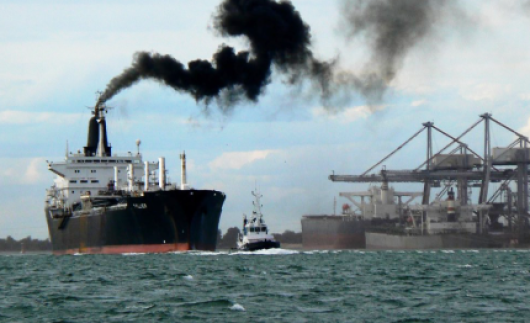and the maritime industry is heading full sail towards it…

Gas emissions discharged from commercial cargo vessels have become one of the major global environmental concerns within the maritime industry. These harmful gases are produced through the burning of the bunker fuel used to power most large vessels around the globe, with ships typically using between 1 and 16 tonnes of bunker fuel per hour. Environmental legislation for shipping is gradually catching up with other industries in limiting of pollutants in emissions. The UN body responsible for shipping standards, the International Maritime Organisation (IMO), is pushing ahead to implement significantly strengthened emission controls. Beginning on 1st January 2020 a new regulation, approved by the IMO, requires virtually all ships to limit their sulphur emissions to less than 0.50% m/m (mass by mass). For most maritime operators this regulation represents a substantial change, the current limit being 3.50% m/m in most parts of the world.
It has to be said that most people outside the shipping industry are generally unaware of the huge impact it has on global commerce and, in turn, the global economy. Although this new regulation has to be welcomed, given the obvious direct (and indirect) anticipated health and environmental benefits, it represents a substantial challenge to all shipping operators (with associated costs) in order to meet the new limits.
To put the perceived health benefits of enforcing this regulation into context a recent study by the IMO cited that not reducing the sulphur limit “would contribute more than 570,000 additional premature deaths worldwide between 2020-2025”. Moreover, recent research has concluded that the average life expectancy lost per person globally due to particulate pollution (including sulphur oxide) amounts to 1.8 years (put in context the comparable figure for smoking is 1.6 years).
In essence ship operators now have three options for complying with this regulation:
1. Switch to low-sulphur fuels (LSFO) – including the cost of cleaning tanks, pipes and pumps
2. Install exhaust gas cleaning systems (known as “scrubbers”)
3. Covert the vessel (or fleet) to burn alternative fuels (notably LNG)
To address these viable options in turn:
Switch to low-sulphur fuels
Switching to LSFO is likely to be expensive. At present it is estimated c 75% of the fuel that the world’s shipping fleet burns is high sulphur heavy fuel oil (HSFO). Currently HSFO costs in the region of US$450 per tonne. By comparison the equivalent LSFO currently costs circa US$750 per tonne. Switching to a LSFO source that enables compliance could cost a large vessel operating company a significant hike in their annual fuel bill (AP Moller-Maersk A/S, the world’s largest container shipping line, claims that its fuel costs will rise by an extra US$2bn per annum; that’s almost 60% higher than it paid in 2017). Indeed, recent studies suggest a switch to these low sulphur fuels could cost the global merchant fleet in the region of an extra $40-$60bn per annum (depending which study you believe), putting additional pressure on an industry already struggling with excess capacity.
Install “scrubber” systems
Installing on-board scrubbers on vessels is unlikely to be widely adopted initially, given the upfront capital outlay required to purchase and fit the equipment, as well as the uncertainty around how the technology would work on large vessels. On paper the economic case for larger and newer vessels looks compelling (given the longer lifespan to pay back the investment). However, given the levels of uncertainty, the capital investment required and the need to schedule dry dock time it is anticipated that there will be very few scrubbers expected to be retro fitted by next year (current estimates anticipate in the region of around 1 to 2 thousand vessels/from a total of c 90,000 vessels). Indeed, it is more likely that scrubbers will be fitted to new build vessels rather than retro fitting existing fleets.
Convert to alternative fuel sources
The last option, switching to a propulsion system that burns LNG or alternative fuels like liquid petroleum gas, methanol or hydrogen represents the direction the maritime industry is headed. The question is how soon. While LNG is a good option environmentally, the infrastructure for supplying it is still relatively undeveloped. The propulsion systems are also comparatively expensive and complicated, although this is anticipated to come down over time. LNG will certainly not be available at scale by 2020, due to the high cost of retro fitting a vessel to use it and a lack of infrastructure to support it. LNG exceeds all IMO emission standards and could be significantly cheaper than HSFO. However, again, given the above factors, relatively few existing ships will be converted to run on LNG or alternative fuels. Instead these propulsion systems are projected to feature more prominently in orders for new ships.
So what next?
Although the scope of this directive seems modest, the industry has never faced a new regulation with such wide impacting implications (the closest being the move to double hulls on tankers following the Exxon Valdez disaster – which only impacted one category of vessel). Regardless of the approach ship owners choose to follow, the general consensus is that transport costs will certainly rise (perhaps sharply). As the economics change then so, certainly, will the operating models to improve operational efficiencies.
The expected increase in fuel costs leads many industry stakeholders to believe that the focus on energy efficiency measures will certainly intensify. Fuel-efficient vessels will be more competitive, while vessels with scrubbers installed may have a significant competitive advantage. It is expected that, certainly initially, vessels with scrubbers will be able to secure premium charter rates. Conversely those vessels that do not have scrubbers fitted may be forced to reduce their rates to unsustainable levels, eventually driving them out of the market and rendering older vessels unprofitable to maintain. This may lead to higher scrapping activity and, subsequently, a renewal of the fleet with modern, more efficient vessels. This trend could also accelerate the introduction of alternative fuels, such as LNG. These are all potential movements that will need to be monitored very closely over the coming years by all participants in the maritime industry.
So to the maritime insurance market…
These likely trends will also impact the overarching marine insurance market, with insurance providers becoming concerned about a whole host of additional risks within potential policies that were previously not considered in depth. Marine cargo insurers are expected to revise their policies to cover such cases, due to issues related to the global sulphur cap. These new challenges may lead insurers to accept the risks by increasing their premiums, reflecting the uncertainties of the new reality. Similarly, given the above factors, the future valuations of existing vessels will become trickier and potentially more volatile as the impacts become clearer. Additionally, charter party clauses, relating to bunkers, will also need to be reviewed to avoid disputes. During the transition to the sulphur cap, there can be a big difference in fuel prices and this risk must be accounted for in the charter party. Other risks include, among others, the unavailability of compliant or compatible fuel and performance variations due to fuel quality.
To conclude what is clear is there are multiple issues and implications to be considered and, indeed, numerous potential solutions, but all these will come at a financial cost which could significantly alter the traditional dynamics of this global industry. However, despite shipping already being one of the most environmentally friendly ways to move cargo (compared certainly to road or air transportation), it is clear these new regulations should result in us living healthier and more productive lives once this directive goes into effect, which can only be viewed as a good thing for all our futures.
by Michael Lawson : Chairman of Klapton’s AFI Committee and Member of the Maritime Sureties Committee
Klapton has this year added maritime expertise to its Sureties business and is seeking insurance opportunities in the residual value and investment protection space within the sector, both on a regional and international basis.
Photo by Roberto Venturini / CC BY 2.0


